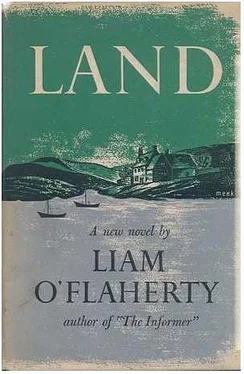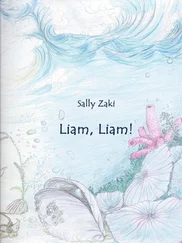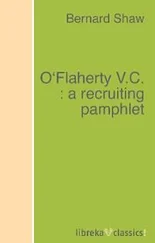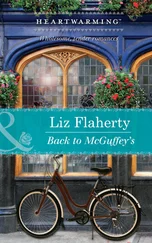Liam O'Flaherty - Land
Здесь есть возможность читать онлайн «Liam O'Flaherty - Land» весь текст электронной книги совершенно бесплатно (целиком полную версию без сокращений). В некоторых случаях можно слушать аудио, скачать через торрент в формате fb2 и присутствует краткое содержание. Город: London, Год выпуска: 2011, ISBN: 2011, Издательство: Bloomsbury Publishing, Жанр: Проза, на английском языке. Описание произведения, (предисловие) а так же отзывы посетителей доступны на портале библиотеки ЛибКат.
- Название:Land
- Автор:
- Издательство:Bloomsbury Publishing
- Жанр:
- Год:2011
- Город:London
- ISBN:9781448203888
- Рейтинг книги:3 / 5. Голосов: 1
-
Избранное:Добавить в избранное
- Отзывы:
-
Ваша оценка:
- 60
- 1
- 2
- 3
- 4
- 5
Land: краткое содержание, описание и аннотация
Предлагаем к чтению аннотацию, описание, краткое содержание или предисловие (зависит от того, что написал сам автор книги «Land»). Если вы не нашли необходимую информацию о книге — напишите в комментариях, мы постараемся отыскать её.
Land — читать онлайн бесплатно полную книгу (весь текст) целиком
Ниже представлен текст книги, разбитый по страницам. Система сохранения места последней прочитанной страницы, позволяет с удобством читать онлайн бесплатно книгу «Land», без необходимости каждый раз заново искать на чём Вы остановились. Поставьте закладку, и сможете в любой момент перейти на страницу, на которой закончили чтение.
Интервал:
Закладка:
By the open doorway, where the carbines were stacked under guard, four officers stood chatting in subdued whispers. They were rosycheeked young Englishmen, very smart and gay in their dress uniforms. All four of them had been sent down quite recently from the training depot in Dublin, to serve with flying columns of this sort on special missions. They came to attention as Fenton strode into the tent.
“Seen my Head Constable?” Fenton enquired of them.
One of them pointed towards the far end of the refreshment table and said:
“There he is. The lucky dog is cheerfully wetting his rather large whistle with a quart of good ale.”
Fenton beckoned to one of the men guarding the carbines.
“Send Head Constable Reilly here at once,” he said after the man had approached.
The constable saluted and then trotted smartly down the tent, one hand on the empty scabbard of his side-arm.
“Awfully decent of Mongoole to give a party of this sort for the men,” said another of the young deputy inspectors to Fenton. “Makes them feel that their work is appreciated. That sort of thing helps discipline.”
Fenton’s troubled eyes narrowed as he looked at the young man who had spoken.
“That’s all rot,” he said bitterly.
The young man looked puzzled and embarrassed.
“Oh!” he said in confusion. “I merely thought that …”
“Good idea not to think when you’re on this sort of work,” Fenton interrupted.
“I see,” said the young man, now blushing deeply.
Head Constable Reilly, a thin man of great height with moustaches that reached out at least three inches on either side of his mouth in a perfectly straight line, came to a halt two paces from his superior. There he stood rigid as a post. His blue eyes were as keen and ruthless as those of a hawk.
“Yes, sir?” he said.
The four young officers looked at one another sheepishly as Fenton moved away to converse in private with the Head Constable. They had been put ill at ease by the boorish remarks of the District Inspector.
“Look here, Reilly,” Fenton said in a low tone, “I want you to see that the men don’t drink too much. We’re going to have plenty of trouble to-day.”
“Looks like it, sir, by all reports,” Reilly said.
“Wouldn’t do to have the fellows in any way groggy,” Fenton said, “under the circumstances.”
“You may rely on me, sir,” Reilly said.
Then he inclined his head slightly towards the group of civilian rowdies, as he added in a somewhat contemptuous undertone:
“What about our friends beyond there? They are lowering the stuff by the gallon. I have no authority to stop them.” Fenton’s face darkened.
“Let those swine drink until they burst, if they feel that way inclined,” he cried in a tone of most unseemly passion.
Reilly’s sharp blue eyes looked astonished. He had been twenty-seven years in the armed forces, partly as an infantry man in the army. This was not the first time he had seen a man’s nervous system reach the breaking point under heavy pressure. He cleared his throat loudly, took a short step to his rear, clicked his heels and saluted.
“Very good, sir,” he said.
Fenton returned the salute and strode out of the tent, followed by the four deputy inspectors. The five men fell into line and marched across the close-cropped level sward, beneath tall trees, with long, rhythmic strides. Their lean, disciplined bodies moved in perfect unison. The metal of their helmets kept flashing in the sunlight. Out here in the open their uniforms looked black against the emerald grass and the grey bulk of Killuragh Castle that rose majestically in front.
“When you fellows have been a little longer in this country,” Fenton said bitterly, after they had marched about twenty paces from the tent, “you will realise that it’s useless making gestures of this sort towards the Irish.”
“But I wasn’t referring to the Irish,” said the officer who had spoken about the party. “I was referring to our fellows.”
“They’re Irish, too,” Fenton said. “They hate us, even though we have put them in uniform and made them swear allegiance to Her Majesty. They obey us as long as we pay them, but they hate us just the same.”
He suddenly tugged at the collar of his uniform and added in a tone that was almost hysterical:
“I tell you they all hate us. All of them.”
The four men glanced at him in the way the Head Constable had done. They were shocked by what they saw. They looked to their front again hurriedly, just as if they had inadvertently come upon something obscene. In their world, there was no provision made for the existence of personal tragedy.
Killuragh Castle was a building of great size, standing above a range of steep cliffs that overlooked the sea and the town of Clash. To the rear lay a broad, fertile plateau, bound by mountains to the east. It was not a house of beautiful design, like the Norman fortress that had preceded it on this site for many centuries, during the reign of the St. George family. In the course of one hundred years, however, the crude lines of the new castle had become endowed with romantic charm by the rains and the fierce blows of the Atlantic storms. Its walls were now half covered with ivy.
Having walked round the house, the officers entered an Italian garden through a small bronze gate that was set in a highly ornamented wall.
“I say!” cried one of the deputy inspectors. “What a marvellous place! Must have cost a barrel of money.”
“Exactly as my father described it,” said another with boyish excitement as he looked about him. “He visited Killuragh several times, when he was in Ireland with the Lancers.”
The host and hostess received their guests beside a large pool, built of exquisite Connemara marble and filled with crystal-clear mountain water. They stood halfway up a row of steps that led to a band-stand.
“Come and see us any hour, day or night,” Lord Mongoole said vaguely to each of the five men.
The fourth earl of that name was an insignificant little man of thirty-seven, with sad eyes, a sallow face, a bald crown and an exceptionally long nose. He had the harried look of a man that is in debt up to his ears. Of all the vast fortune that his great-grandfather had brought back as loot from India there was scarcely a sovereign left in ready cash. That was why he was now compelled to evict three villages of peasants, in order to get a few thousand guineas from Captain Butcher as down payment on a ninety-nine-year lease of their holdings. His wife was a lean woman of very ugly features, except for really beautiful grey eyes. She kept talking to another woman, in a high-pitched voice that was rather engaging, while she received the young men. She looked very smart in a black dress and a fine pearl necklace.
Fenton drifted away from his companions on reaching a marquee where champagne and a buffet lunch were being served by a large number of liveried servants. He took a glass of wine and drank it all, hoping to get rid of the horrible depression that had lain heavy on him since awaking that morning. The wine merely intensified his unhappiness by reminding him of his love for Barbara. Ever since his unfortunate interview with her at Manister House, he had tried to put her out of his mind. He now gave free rein to his passion once more, feeling that all was lost and that further effort was senseless.
“My love!” he whispered to himself in despair as he wandered about among the guests, hoping to catch sight of her. “My darling love!”
More than one hundred people had already arrived. Others kept coming in a steady stream. Like all the great landowners of that period, the Mongooles spent only a few days each year on their Irish estate. They came to Killuragh about this time each summer, gave a party for the local gentry and then returned to England. It was like an annual memorial service for a feudal system that was moribund. The local members of the English “garrison” flocked to the castle for these receptions with the pathetic eagerness of provincials. They came dressed in finery that only saw the light on very exceptional occasions, for they were mostly people in somewhat modest circumstances. Here they were, moving about among the flowers and statues, or sitting under broad umbrellas at little tables, chattering like a flock of migratory birds that have settled to rest for a little while at some place alien to them. The perfumed dresses of the women, the bright uniforms of the Hussar and artillery officers of the district garrison, the elegant morning clothes of the landowners and officials gave an impression of aristocractic splendour against the background of the vast grey castle and its lovely garden.
Читать дальшеИнтервал:
Закладка:
Похожие книги на «Land»
Представляем Вашему вниманию похожие книги на «Land» списком для выбора. Мы отобрали схожую по названию и смыслу литературу в надежде предоставить читателям больше вариантов отыскать новые, интересные, ещё непрочитанные произведения.
Обсуждение, отзывы о книге «Land» и просто собственные мнения читателей. Оставьте ваши комментарии, напишите, что Вы думаете о произведении, его смысле или главных героях. Укажите что конкретно понравилось, а что нет, и почему Вы так считаете.












